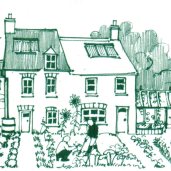During the Transition Training we watched a lot of images and videos of Transition Initiatives, and at first I watched them with mixed feelings of joy and anxiousness. My heart sank because I inevitably thought: “I can’t make that happen.”
That sinking feeling stems from the fact that, though I arrived here over 11 years ago, studied, married, bought a house and had a child here, I still don’t feel at home. Why? Not because of the people around me: I have found each and every one of my colleagues, neighbors and friends – Americans or not – to be sincerely welcoming. So it must be me.
I always assumed children have a natural sense of being at home, for I myself, as a child, felt at home, without ever a shadow of a doubt. But was it because of something a child does or is, or was it because of what my parents did and modeled? Or was it because of the place?
The place was Antwerp (Belgium), a city within half an hour’s drive of the city where my grandparents and aunts and uncles all lived. A place where my family can trace and place our ancestry as far back as the 1700s. And a place with a culture in which “migrating” is the exception. You see, Belgians don’t leave Belgium: the emigration rate is less than a percent. And Belgium is a small country, about the size of Maryland, so children “leave†(for college, or to live) to within at most a two hours’ drive away from their parents. In my family I was the third (out of four now) in the span of two generations to move abroad, which makes my family exceptionally migratory.
Let’s put this in context. The United Nations Commission on Population and Development concluded in 2006 that only 3% of the world population is an international migrant (with most migrants moving from developing to developed countries). The kind of mobility within the United States that makes for big moves, in contrast, is high: the Census of 2000 determined that, within 5 years, no less than 8.42% of its respondents had moved to another state and an additional 2.86% to a foreign country. That number has in all probability gone up in the last couple of years.
So let’s just say that my Amie is seeing a home very different from what I saw as a kid. We see family once or twice a year, not every weekend. Mama and Baba have strange accents – and so does she, insisting on “woh-T-er”. Mama and Baba can’t vote and they don’t know how to negotiate certain communal systems. So I am afraid that Amie will not know what “home” is, or that she will call “home” something that I would call but a weak version of my own rich childhood memory of home.
And so I must ask myself: can I, dare I, make this place my home? What if home means not just the core family of the three of us, not just lengthy visits (visits: that says it all) from grandparents and aunts and cousins, not just local traditions with good, good friends that we see often… but also the wider culture of a hometown?
The Training helped me realize that I should make this hometown happen, for myself, for Amie, and that it is possible. That this what a Transition Initiative could mean to me, my family, and the people in my community: not just becoming more resilient in the face of peak oil, climate change, and economic crisis, but first and foremost what our trainer called “becoming indigenous toyour place”: coming home.
{Previously, about Transition: the giving of gifts}

Very interesting post. Having moved 4 times within the past 4 years, I understand that feeling of not having a sense of “home”. And this is my native country! I think you hit the nail on the head though, it is a larger sense of community (hometown) that enables one to feel like they belong to a place. I agree that it is something that has to be actively sought and that we have to make the choice to participate. I think though, the rewards outweigh the risks, especially for Amie.
As you observed in your post, relocation is part of American culture. I know as many people who moved around their whole childhoods as I do who lived in the same place. I was a mover. My husband was not (although he was in the military as an adult and did some traveling, which is how we met ;).
I think there are probably a lot of ‘natives’ in your community who feel just like you do. I’ve been in my house for twelve years. It took me more than four years just to start meeting people in my community, and it took almost a decade before I started to feel like this was “home.” Sometimes I still think about moving to a “better” house, but I always stop short of taking any real action, because I can’t imagine leaving my neighbors ;).
Could you give some information about where one can take Transition Training classes?
Hi Mary,
go to http://transitionus.org/ or google the more local Transition network – e.g. “Transition Initiative Massachusetts”. Most States have one, I believe, usually on the ning. There will be a tab called Events or some such, and Trainings near you (if any) will be listed. Be sure to become a member, then you can ask around and get email updates.
Hope that helps. Good luck!